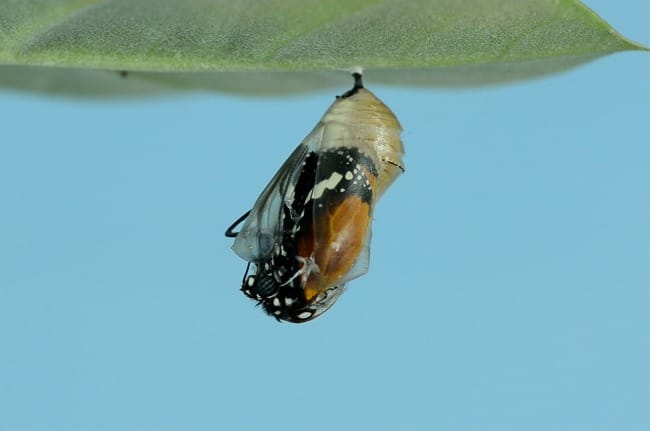Some words permanently change the way we see things. This is the first of a short series in which I will be sharing pieces of prose that have significantly shaped how I see the natural world and my relationship to it. First up is the book Pilgrim at Tinker Creek, by Annie Dillard, which has stuck with me ever since reading it many years ago. It is 50 years old as of this year and won a Pulitzer Prize the year after its publication.

The Act of Sight
Pilgrim at Tinker Creek is persuasive in showing that everything in this creation is worth paying attention to. I myself have witnessed many, many moments in the natural world that stunned me, and Dillard's experiences as recounted in this narrative, which follows the course of a year, affirm and stretch those experiences. I believe that if a person isn’t bowled over by creation several times a day, it is because they aren’t paying enough attention, rather than there being nothing amazing taking place around them. The quotes I share from Pilgrim at Tinker Creek are just bite-size tastes of Dillard's work, but even so, I hope readers unfamiliar with the work will be intrigued and even instructed in ways of being that help them to look at the world more closely and with more engagement. And for those who already know the book, may it be a refreshing reminder of those things.

Dillard's prose reads as if written by a poet, which she is. Reading her book is a bit like moving between poetry and prose, with a focus that moves in to the particular and then out to the bigger view like a microscope changing focus from a single organism on a slide to the larger field of view. You encounter this movement in passages such as this:
About five years ago I saw a mockingbird make a straight vertical descent from the roof gutter of a four-story building. It was an act as careless and spontaneous as the curl of a stem or the kindling of a star.
The mockingbird took a single step into the air and dropped. His wings were still folded against his sides as though he were singing from a limb and not falling, accelerating thirty-two feet per second, through empty air. Just a breath before he would have been dashed on the ground, he unfurled his wings and with exact, deliberate care, revealing the broad bars of white, spread his elegant, white-banded tail, and so floated onto the grass. I had just rounded a corner when his insouciant step caught my eye; there was no one else in sight. The fact of his free fall was like the old philosophical conundrum about the tree that falls in the forest. The answer must be, I think, that beauty and grace are performed whether or not we will or sense them. The least we can do is try to be there. (p. 7, Pilgrim at Tinker Creek, © 1974, Annie Dillard).
The least we can do is try to be there. I absolutely believe that statement. In many ways, I think of myself as a patient and attentive observer of the world around me. When I glimpse something intriguing, I try to stop and take another, closer look, or, if I see it through a window, I try to get myself beyond the glass. Dillard’s attentiveness, patience, and passion, however, make mine look trivial in comparison; I still have much to learn from her.
Or perhaps it is just a matter of continuing on, looking and learning, opening ourselves up to curiosity and exploration. As she says,
If you can’t see the forests for the trees, then look at the trees; when you’ve looked at enough trees, you’ve seen a forest, you’ve got it. (p. 129)

The Posture of Sight
Dillard recounts story after story of following an unknown trail, staying out all night, holding a particular position for an uncomfortably long time, in order to see some creature that would hide or run away if she moved even slightly. It’s easy to say that Dillard’s method of seeing involves a lot of time and effort, but what this means exactly—the extent of effort, time, attentiveness, and curiosity required to see in the way the Dillard does—are more than most of us would expect, yet she makes the reader feel that whatever it costs for those experiences, they are a small price, even when it means hunkering down in a bush for several hours.
My only weapon was stillness, and my only wish was its continued presence before my eyes. I knew it would fly away if I made the least wrong move. (p. 187)

In stalking a muskrat, she says:
…he never knew I was there. I never knew I was there, either. For that forty minutes last night I was as purely sensitive and mute as a photographic plate; I received impressions, but I did not print out captions. My own self-awareness had disappeared; it seems now almost as though, had I been wired with electrodes, my EEG would have been flat. I have done this sort of thing so often that I have lost self-consciousness about moving slowly and halting suddenly; it is second nature to me now. And I have often noticed that even a few minutes of this self-forgetfulness is tremendously invigorating. (p. 198)
An important part of seeing is getting outside of the confinement of one's own limited concerns and imaginatively entering into the life of another. Often, it isn't our movement that ultimately enables us to see what is happening around us, but our stillness in both mind and body that makes it possible. A lessened attention on ourselves and a greater attention given to something outside of ourselves allows us to see and understand another creature better. When we still ourselves and pay attention, it's easier to enter into that other creature's life.
As Dillard points out in her book, we never know when the moments of encounter and amazement will happen. They are unpredictable and surprising. Being in a posture of readiness and curiosity toward whatever we might see means that we will be less likely to miss those moments of astonishment when they come before us. Being attentive in mind is at least as important as being attentive in our body.
I cannot cause light; the most I can do is try to put myself in the path of its beam. It is possible, in deep space, to sail on solar wind. Light, be it particle or wave, has force: you rig a giant sail and go. The secret of seeing is to sail on solar wind. Hone and spread your spirit till you yourself are a sail, whetted, translucent, broadside to the merest puff. (p. 33)

What Sight Tells Us
Dillard doesn't have easy answers to the question of the meaning of what she sees. She gives example after example of the ways in which creation (and perhaps God) seems cruel, or senseless, or ugly. She confronts the presence of violence and pain that are part of life—and death. In fact, she asserts that "only the newborn in this world are whole, that as adults we are expected to be, and necessarily, somewhat nibbled."
If a creature has been around for a while, it has been affected, and usually permanently damaged and changed by one or many battering experiences. A moth has lost a wing; a fish has scars; an animal has parasites living inside of it.
Parasitism: this itch, this gasp in the lung, this coiled worm in the gut, hatching eggs in the sinew, warble-hole in the hide—is a sort of rent, paid by all creatures who live in the real world with us now. (p. 232)
She includes herself in this diagnosis.
I am aging and eaten and have done my share of eating too. I am not washed and beautiful, in control of a shining world in which everything fits, but instead am wandering awed about on a splintered wreck I’ve come to care for, whose gnawed trees breathe a delicate air, whose bloodied and scarred creatures are my dearest companions, and whose beauty beats and shines not in its imperfections but overwhelmingly in spite of them, under the wind-rent clouds, upstream and down. (p. 242)

But even as she turns a realistic eye upon the state of the world, and grapples with these hard moral questions, she comes back again and again to the assertion that beauty is a true thing. She does this by dropping examples of it into the book like the pennies she uses as a metaphor in the book.
The world is fairly studded with strewn pennies cast broadside by a generous hand. But—and this is the point—who gets excited by a mere penny? …It is dire poverty indeed when a man is so malnourished and fatigued that he won’t stoop to pick up a mere penny. But if you cultivate a healthy poverty and simplicity, so that finding a penny will literally make your day, then, since the world is, in fact, planted in pennies, you have with your poverty bought a lifetime of days. It is that simple. What you see is what you get. (p. 14)
As I said, these are only a few tidbits from Pilgrim at Tinker Creek. If you haven't already read it all the way through, I encourage you to find a copy and do so. You will be amazed. If you've read it, and some part of it particularly stuck with you, let me know in the comments below!
Reflection Question: When was the last time you became thoroughly absorbed in the curiosity of understanding another creature's life? What habits do you have that make room for the surprising and astounding happenings of the natural world?
Annie Dillard is a poet, novelist, and essayist whose work you can find here (or in your local library). You will find her website here.

Annie Dillard receiving a National Humanities Medal in 2015
Feel free to leave a comment below or contact me directly at louise.conner@circlewood.online.
Louise
Want to learn more?
Find out more or support our parent organization by clicking below.